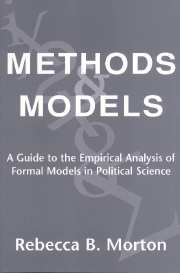Book contents
- Frontmatter
- Contents
- Acknowledgments
- I Introduction
- II Formal Models in Political Science
- III Empirical Evaluation of Formal Models
- 4 Fundamentals of Empirical Evaluation
- 5 Evaluating Assumptions
- 6 Evaluating Predictions: Equilibria, Disequilibria, and Multiequilibria
- 7 Evaluating Relationship Predictions
- 8 Evaluating Alternative Models
- IV A Second Revolution
- References
- Name Index
- Subject Index
4 - Fundamentals of Empirical Evaluation
Published online by Cambridge University Press: 10 December 2009
- Frontmatter
- Contents
- Acknowledgments
- I Introduction
- II Formal Models in Political Science
- III Empirical Evaluation of Formal Models
- 4 Fundamentals of Empirical Evaluation
- 5 Evaluating Assumptions
- 6 Evaluating Predictions: Equilibria, Disequilibria, and Multiequilibria
- 7 Evaluating Relationship Predictions
- 8 Evaluating Alternative Models
- IV A Second Revolution
- References
- Name Index
- Subject Index
Summary
Now that I have examined what formal models are and are not, I present in this chapter an over view of the fundamentals of empirically evaluating formal models. The basic question in such evaluation is: How does the structure of a formal model translate into the mathematical structure of an empirical or statistical model? Before addressing this question, I appraise the types of empirical evaluations of formal models.
Types of Empirical Evaluations of Formal Models
Empirical evaluation of formal models may be organized as follows:
evaluation of assumptions;
evaluation of predictions;
evaluation of alternative models.
As shown in Chapter 2, assumptions are an integral part of formal models, and many are not verified. Even so, empirical support for assumptions can be important for evaluating theory. I explore the meaning of evaluating assumptions in the next chapter. Evaluating predictions and alternative models are the two means of assessing a formal model, given its assumptions, with respect to the real world.
Evaluating Predictions
Imagine that the impossible is possible – that a formal model exists in which all of theassumptions have empirical support. Is it necessary then to evaluate predictions of the model at all? If the predictions have been derived appropriately, using deductive logic, can the researchers simply conclude that the predictions are true because the assumptions are known to be true? Even in such a perfect situation, it is still necessary to analyze predictions of models. A researcher may be in error in believing that the assumptions are true, or he may have erred in his deductive logic.
- Type
- Chapter
- Information
- Methods and ModelsA Guide to the Empirical Analysis of Formal Models in Political Science, pp. 101 - 141Publisher: Cambridge University PressPrint publication year: 1999



